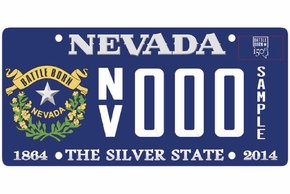Nevada Senate kills special license plate bill
CARSON CITY — In a rare vote that killed a bill, the Senate late Monday evening on a 10-11 vote rejected an Assembly-approved bill that would have limited the designs charitable groups can place on special license plates.
Assembly Bill 243 was among only four bills that have been killed this session, which has just two weeks to go, according to Senate Secretary David Byerman.
Sen. Don Gustavson, R-Sparks, complained that the bill would limit the designs that groups want to put on plates to one-third of the plate’s length.
Gustavson noted that they use the special plates to raise money for their causes and the program has been a popular moneymaker. Buyers of the special plates pay additional money each year for the plates that goes to the causes.
Nevada is even creating a special plate to celebrate the state’s 150th anniversary on Oct. 31, 2014.
The bill, proposed by the Assembly Transportation Committee, passed the Assembly 32-7.
Critics of the special plates have complained there are so many of them that the police have a hard time identifying the state that issued the plate. Generally the special plates are limited to 25 nonprofit organizations.
Gustavson, one of the Senate’s most conservative members, won the support of Senate Majority Leader Mo Denis, D-Las Vegas, and Sen. Debbie Smith, D-Sparks, in his effort to kill the bill.
Former Assembly Speaker Richard Perkins, D-Henderson, was critical of the special plates, contending the primary purpose of the plate should be for identification purposes. Perkins was a police officer.
Legislators even created a special committee on license plates in an effort to cut down on all the plate bills introduced by legislators.
This session, however, 13 bills on special license plates have been introduced.
Contact Capital Bureau Chief Ed Vogel at evogel@reviewjournal.com or 775-687-3901.






















